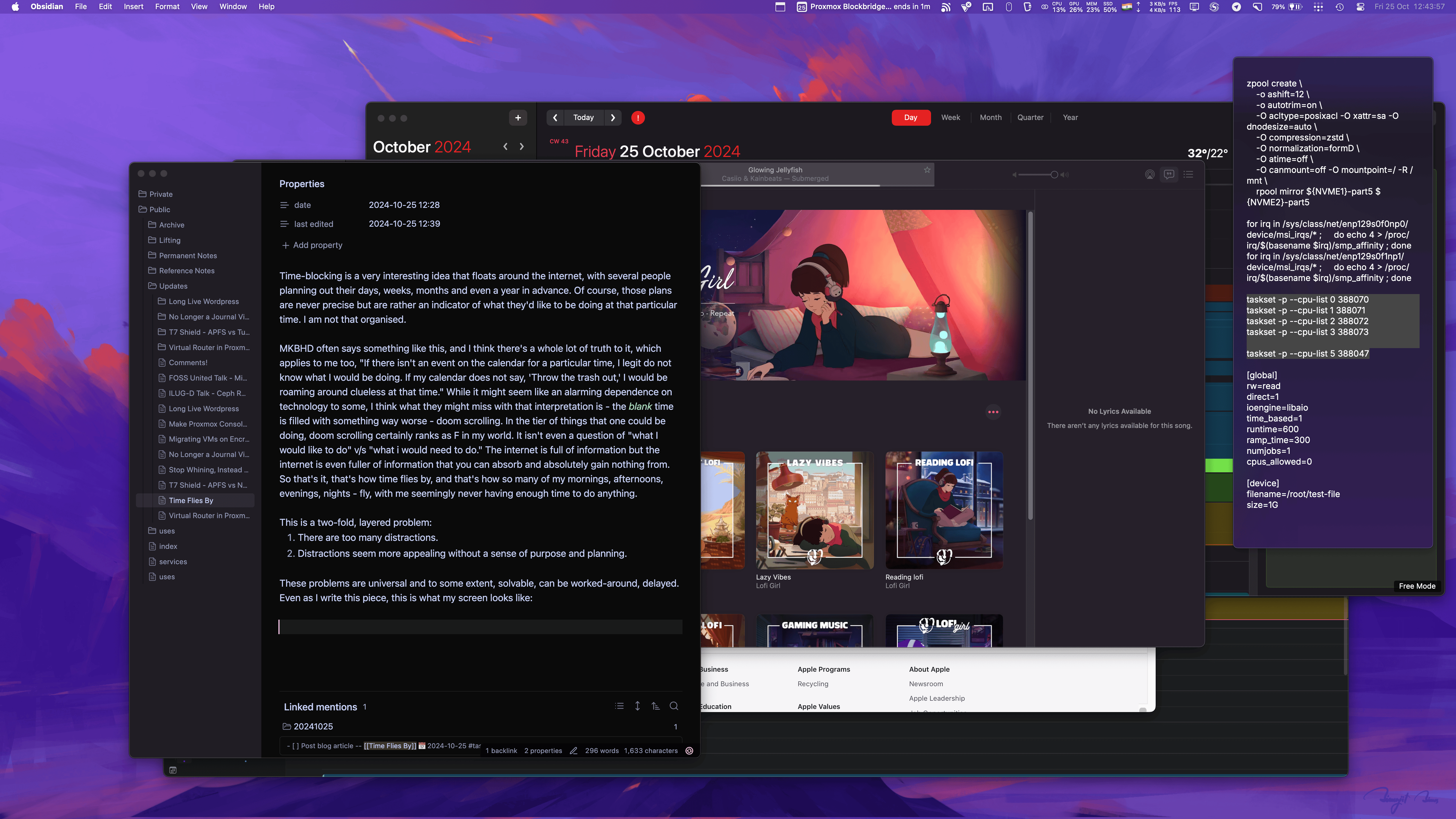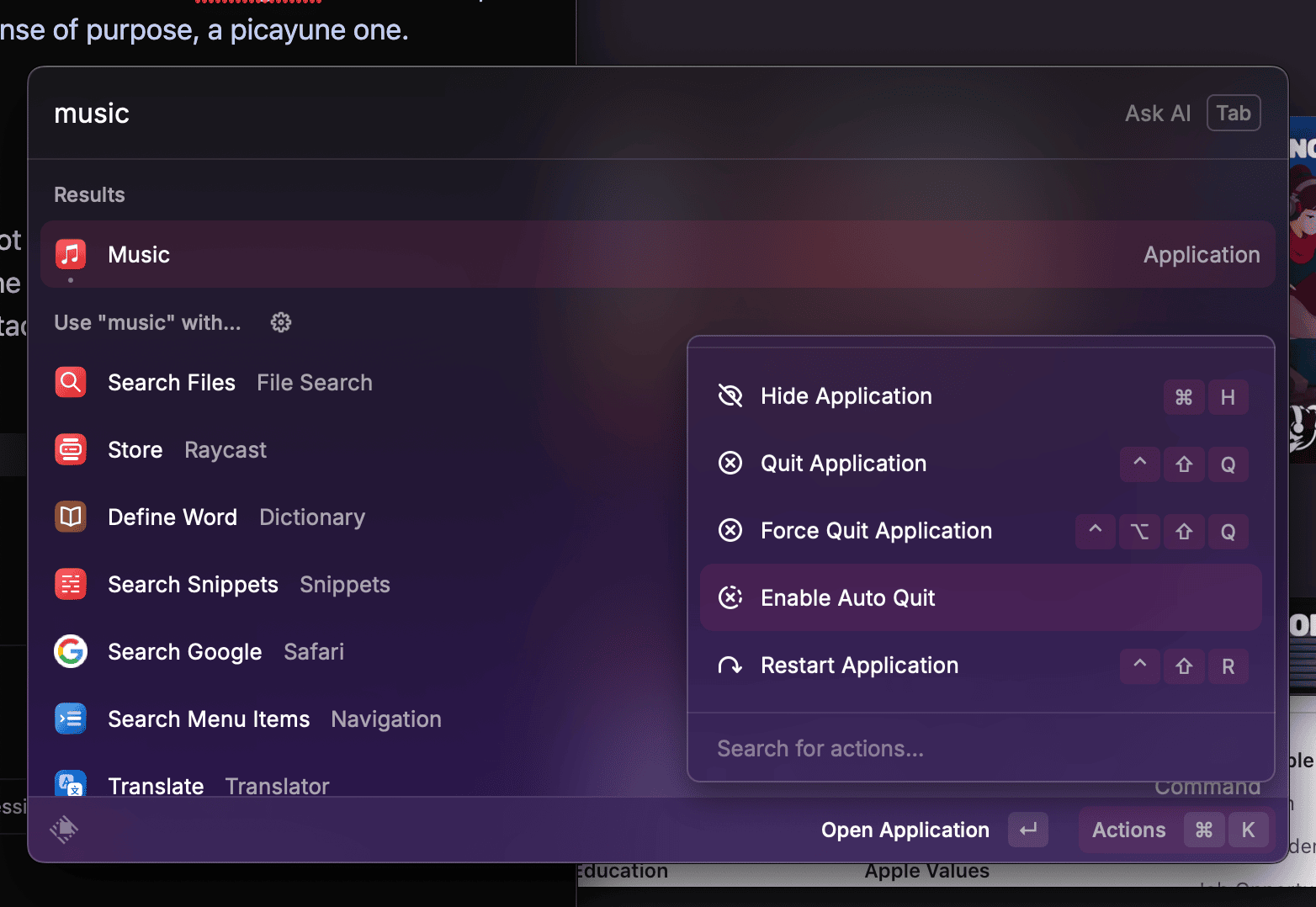Intro
Time-blocking is a very interesting idea that floats around the internet, with several people planning out their days, weeks, months and even a year in advance. Of course, those plans are never precise but are rather an indicator of what they’d like to be doing at that particular time. I am not that organised.
MKBHD often says something like this, and I think there’s a whole lot of truth to it, which applies to me too, “If there isn’t an event on the calendar for a particular time, I legit do not know what I would be doing. If my calendar does not say, ‘Throw the trash out,’ I would be roaming around clueless.”
While it might seem like an alarming dependence on technology to some, I think what they might miss with that interpretation is - the blank time is filled with something way worse - doom scrolling. In the tier of things that one could be doing, doom scrolling certainly ranks as F in my world. It isn’t even a question of “what I would like to do” v/s “what i would need to do.” The internet is full of information but the internet is even fuller of information that you can absorb and absolutely gain nothing from. So that’s it, that’s how time flies by, and that’s how so many of my mornings, afternoons, evenings, nights - fly, with me seemingly never having enough time to do anything.
This is a two-fold, layered problem:
- There are too many distractions.
- Distractions seem more appealing without a sense of purpose and planning.
These problems are universal and to some extent, solvable, can be worked-around, delayed. Even as I write this piece, this is what my screen looks like:

I have a few ideas on how to work-around distractions that may or may not work for you, the reader:
Getting Rid of Distractions
Don’t Go Cold-Turkey
Visualising distractions as an all-or-nothing problem is as harmful as doing nothing about them. If you take away all distractions and fill your time with nothing but things that you are supposed to be doing, you end up burning yourself out. The burn-out may happen in a day, week or might take a bit longer, depending on how addicted — rather how much of those distractions fill up your day-to-day life. If all you did was scroll instagram and now you’re somehow supposed to be doing important things, you’d find a new instagram in a no time, which is to say, distractions are plentiful and your sense of purpose, a picayune number of one.
Start Small
Examples are their own explanation. In the screenshot above, the simplest workaround is to get rid of those distractions would be just to close the windows or minimise them.
However, a nicer solution is to leverage your own arsenal of tools to tackle the problem - in my case, that is using Raycast Auto-Quit, which quits the apps automatically after a certain period of time (configurable). If the app is playing music like Apple Music is, it will just close the window instead.

Take Smaller Steps
Let changes sink in, enough for them to give you a feeling that you are utilising your time better than you were. Then make the next change.
For example, recently I have started using this app called OneSec (came across it because of an Ali Abdaal short) which lets you configure simple shortcuts on iOS to block any offending apps. When you try to open the offending app, iOS redirects you to onesec which then displays a seemingly long flow transition, which is enough for me to get bored and quit the app. Since most of my attempts of opening social apps are tied to habit - waiting for a process to finish, resting between sets at the gym, waiting for food to arrive, commute, etc
However, I do not yet use it to block messaging apps where I also spend a small but considerable time on. By making a change small enough to disrupt some of my offending actions while allowing a few others to exist, gives my brain time to adjust and equate the disruption to normalcy.
It’s been two weeks, and I feel like I have been using my time doing way more important things. I get my own space to think more, I don’t have to regurgitate as much futile information I absorb from the internet and then convince myself that it’s important. I think way more - about where my time goes, what should I be doing next, where would I want my life to be in the next year, and I decided to do something about it - which brings me to tackling problem number 2 - Finding a sense of purpose.
A Sense of Purpose
A sense of purpose is never found in things you don’t believe in. It’s found in things you enjoy doing. Then, time flying by is a good thing! However, much like tackling distractions, a sense of purpose isn’t always there - the same way as you cannot always remove distractions. It was far more helpful for me to look at a sense of purpose in the following way - how often do I have it? when do I have it? what are the things that surround it? do those things also cause it?
And this way of thinking helps me a lot. By accepting that I will not be productive a 100% of the time or as often as I would like to be, it makes me not feel guilty. However, not being productive is not the same as not being accountable.
I do want to be accountable - in the sense that I would like to know where my time goes.
I am not a very organised person - in the sense that everytime I try to plan things ahead, I think of the joke, “God saw you planning ahead and laughed.”
But I certainly would like to get there. Planning doesn’t happen in a day or a week. It’s a change in mindset.
So I decided to do the next best thing instead.
Time Tracking
Instead of planning ahead, I decided to add whatever it is I have done as an event in the calendar. This is adding an event after the fact. So my past three days look like this:
![]()
Tracking in this way has the following advantages:
- Calendars are dumb - literally an ics file, therefore immortal.
- Calendars work anywhere, no vendor lock-in, no app lock-in.
- Calendars support linking - for example, I can add time spent on writing this post as an event and copy-paste the obsidian link there. Then in retrospect, I go, “oh, yup I was writing that!”
- You can create an infinite amount of them, have your own categorisation, style, methodology…
Now I really hope I stick to this because this doesn’t depend on any app, it’s quite portable and frictionless (you can ask Siri or Google Assistant or Bixby to create an event for you).
In these 3 days, I have been feeling much better about myself - simply because I know where my time goes and I don’t spend it doubting myself.
References
-
I didn’t come up with the time tracking idea on my own. After my several search queries on the internet about “TickTick Focus Session as Calendar Events,” I came across a reddit comment which forced me to think what I wanted to do - https://old.reddit.com/r/PKMS/comments/14l76io/comment/jpymrtl
-
Ali Abdaal’s video about his Calendar System - https://youtu.be/6o2tm00Ar8A
-
My girlfriend who keeps listening to my babbling so I realise things which work and do not work when I speak them out loud, allowing for new ideas to emerge.
